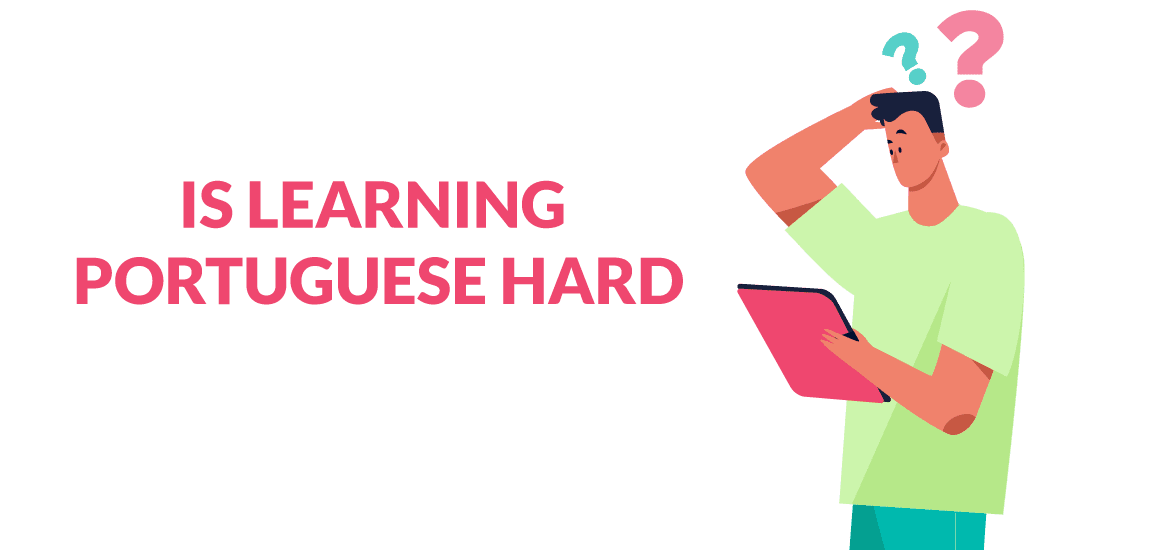
Is Portuguese Hard to Learn? Why Many People Struggle
Portuguese
Although Portuguese may be easy to pronounce, it’s often labeled as one of the hardest languages to learn globally, especially when it comes to speaking and writing the language. The reason? There are five different variations of Portuguese that are said across the globe! Here’s everything you need to know about this popular language and why so many people have trouble learning it.
The grammar rules are tricky.
Portuguese is similar to Spanish, making sense as they’re both Latin-based languages. Like Spanish, Portuguese has three genders: masculine, feminine, and neuter. While learning gender might seem like a strange hurdle for an English speaker (where all nouns are either male or female), it does come in handy for some words.
For example, Portuguese uses adjectives differently than English. In Portuguese, adjectives must agree with their nouns—which means that adjectives must change depending on whether they’re used with a masculine or feminine word.
For example, if you want to say the white dog, you have to use o cão Branco because cão is masculine. If you want to tell the pretty girl, you have to use a Menina Bonita because Menina is feminine. And then, there are irregular verbs and tenses.
It’s not easy, but with practice, you’ll eventually get it. The important thing is to keep at it! Don’t be discouraged by Portuguese’s reputation as one of Europe’s most complex languages; once you start getting into the rhythm of things, everything will make more sense.

The Accent is Hard to Master
The Portuguese language has lots of upsides—it’s beautiful, full of life and character, and music to your ears. It’s also spoken in a rich variety of dialects that add even more flavor. However, as much as many people love Portuguese for all these reasons, its sounds can be complex for them to grasp.
The sounds rr, ch, and g are entirely different from those in English or Spanish. Learning to pronounce these letters is difficult enough without considering how many combinations of vowels and consonants are used! Having an accent can make you seem unprofessional or poorly educated in some cases; therefore, even if you plan on living in a Portuguese-speaking country forever, it’s best if you learn how to speak correctly.
There Aren’t Many Opportunities to Use it in Real Life.
One of Portuguese’s most challenging elements is how rarely it is used outside of Portugal. Brazilian Portuguese and European Portuguese are different, especially regarding pronunciation and particular regional dialects, making it hard for students who learn in one region but travel to another.
And because there aren’t a lot of opportunities to use it abroad, they don’t get a chance to practice what they have learned. It often takes longer for students trying to acquire European Portuguese versus those learning Spanish or French because there isn’t as much opportunity or exposure.
Because Portuguese speakers live primarily in Europe, Brazil, and Africa, people studying Portuguese may not be able to rely on their travels to help them further develop their skills. In some ways, Portuguese is more complex than Spanish to learn—for example, you must take care not to place accents on cover letters that you don’t need; otherwise, you could end up saying something entirely different from what you intended!

Vocabulary Is Difficult
The first thing many new Portuguese speakers notice is that it’s hard to form sentences. The grammar of both languages can seem odd at first (Spanish’s tenses tend to be a bit easier). There are some critical differences in pronunciation, most noticeably in letters like b and v, which sound very different in Portuguese than they do in Spanish (the same is true for d and th).
If you’re familiar with one Romance language, it’ll help you get started learning another one—but if you don’t know any Romance languages, it will take time before your brain can switch between Spanish and Portuguese without making mistakes.
However, once you’ve learned how to speak Portuguese, writing becomes much easier because of Portuguese’s use of written accents over words to change their meaning. While English has a few rules about accents, there aren’t nearly as many exceptions and tricky spellings as in Portuguese. Native English speakers often say that when speaking or listening to someone else speak Portuguese, it seems far more complicated than it is! It just takes practice!
How long does it take to learn Portuguese thoroughly?
It takes 575-600 hours to thoroughly learn Portuguese, according to the Foreign Service Institute (FSI).
What is the hardest language to learn?
The hardest language to learn is often debated. While many languages are difficult to learn, it is often said that the difficult language to learn is Mandarin Chinese. This is because Mandarin Chinese is a tonal language, meaning that the same word can have different meanings depending on the tone in which it is spoken. This can make it difficult for beginners to pronounce words correctly. In addition, Mandarin Chinese has a complex writing system that uses thousands of characters, making it one of the most challenging languages to read and write.
Is Portuguese like speaking Spanish?
No, Portuguese is not like speaking Spanish. Although both languages are Romance languages, they are not mutually intelligible. Portuguese is more similar to the French language and Italian languages than Spanish. Portuguese speakers will often find it easier to learn Spanish than Spanish speakers learn Portuguese.
Some People Never Get Past the Basics.
Even if you’re learning Portuguese in a classroom setting, there’s no way around it: You’ll have to make mistakes. And that may be one of your biggest challenges when learning Portuguese because many native speakers will think of your mistakes as funny or cute—which is something you probably don’t want as a native language learner.
If you find yourself in an informal setting and trying out some new phrases on native speakers, don’t be afraid to ask them if they could repeat themselves slowly or explain what they said so that you can get it right next time.
Don’t worry about being rude; like most people who speak Portuguese, they’ll likely appreciate your effort! But remember that asking for help doesn’t mean you won’t eventually learn Portuguese. Most learners agree that getting feedback from native speakers is a great way to improve quickly.
The trick is finding someone who can give constructive criticism without being too critical (or even overly friendly). Start by asking friends or classmates for help before moving on to more formal settings like tutoring sessions or native language clubs.
The most challenging things about Portuguese
One of the most challenging things about learning Portuguese is pronunciation. There are many sounds in the language that are difficult for English speakers to produce. In addition, the grammar can be pretty complicated. Portuguese has a lot of irregular verbs, and the pronoun agreement can be tricky.
However, with some hard work and dedication, it is possible to learn this beautiful language. Secondly, there are several different dialects spoken in different regions, which can make it difficult to understand others. With some effort and perseverance, however, Portuguese can be a rewarding language to learn.

Portugal’s Language and Culture
Portugal is a fascinating country with a rich culture and history. The Portuguese language is also unique and exciting, with many dialects spoken throughout the country. Here are three interesting facts about Portuguese culture and language. Did you know that Portugal is the oldest country in Europe? That’s right – it was founded in 1139, making it nearly 800 years old! This long history has resulted in a rich culture with many different influences. You can see this in the architecture, food, and music of Portugal. Do you want to know the Portuguese breakfast?
The Portuguese language is also very unique. It is the only Romance language written with the Latin alphabet, but it has many different dialects. Portuguese is spoken differently in Portugal than in Brazil – the two largest Portuguese-speaking countries globally. Portugal is also home to one of the world’s most famous explorers – Vasco da Gama. He was the first person to sail around the Cape of Good Hope, and he opened up the trade route between Europe and India. This made Portugal a mighty country during the Age of Exploration.
The non-Sovereign States Where Portuguese is Spoken
Portuguese is spoken in many non-sovereign states, including Brazil, Angola, Mozambique, and Cape Verde. Although these states do not have sovereignty over their territory, they have significant political and economic power. Portuguese is also spoken in East Timor, a former Portuguese colony now an independent country.
Brazil
Portuguese is the predominant language in Brazil. It is estimated that over 190 million people speak Portuguese in Brazil, making it the largest Portuguese-speaking country globally. Portuguese is a Romance language that originated in what is now Portugal and has since spread to other parts of the world, including Brazil. Portuguese is a member of the Romance family of languages, including Spanish, Italian, and French.
Macau
Macau is a particular administrative region of China, and its official languages are Chinese and Portuguese. Portuguese is spoken by a minority of the population but is an essential language in Macau. Portuguese is the language of education, law, and government in Macau. It is also one of the four official languages of the United Nations.

Angola
Portuguese is the official language of Angola, spoken by approximately 70% of the population. It is also spoken as a second language by around 19% of Angolans. Portuguese is a Romance language that originated in what is now Galicia, in northwestern Spain.
It is the sixth most widely spoken language globally and the third most spoken European language, after English language and Spanish language. Portuguese is also the official language of Brazil, Cape Verde, Guinea-Bissau, Mozambique, and São Tomé and Príncipe.
Cape Verde
Portuguese is the official language of Cape Verde, a country located in the central Atlantic Ocean. It is spoken by the majority of the country’s population, as well as by significant minorities in other countries. Portuguese is a Romance language that developed from the Latin spoken by the Roman Empire. It is the fourth most widely spoken Romance language after Spanish, French, and Italian.
Portuguese Language Learning
Learning Portuguese involves mastering not only its pronunciation and grammar but also expanding one’s vocabulary through dedicated lessons. As a member of the Latin language family, Portuguese shares similarities with Spanish, Italian, and French, facilitating comprehension for learners familiar with these languages. A skilled Portuguese teacher guides students through the intricacies of pronunciation, ensuring accurate enunciation of sounds unique to Portuguese. Additionally, lessons focus on understanding Portuguese grammar rules and building vocabulary, equipping learners with the language skills necessary for effective communication in Portuguese-speaking environments.
In South America, where a diverse array of languages is spoken, mastering verb tenses is fundamental in navigating communication effectively, particularly for those whose native tongues belong to the Germanic language family. Whether embarking on a journey to learn Spanish, Portuguese, or another foreign language, understanding verb tenses is paramount. As learners embark on their language learning journeys, they encounter various verb conjugations and tenses specific to their target language. Through dedicated study and practice, learners gradually grasp the intricacies of verb usage, enabling them to express themselves accurately and fluently in their chosen language.
Language Learning Essentials
Immersing oneself in Portuguese music can significantly enhance comprehension skills, particularly in distinguishing nasal sounds and verb conjugations. Through exposure to various musical genres and artists, learners can attune their ears to the distinct phonetic nuances of the language. Additionally, engaging in language exchange partnerships provides opportunities to practice speaking and listening to Portuguese in authentic contexts. By dissecting song lyrics and discussing them with language exchange partners, learners gain insights into verb conjugations and sentence structures while honing their phonetic language abilities. Thus, integrating Portuguese music into language learning endeavors fosters a holistic approach to mastering the intricacies of the language.
Consistent practice is paramount for mastering Portuguese, encompassing grammar rules, pronunciation nuances, and verb conjugations. By dedicating regular time to language study, learners can internalize grammar structures and effectively apply them in speaking and writing. Listening to Portuguese podcasts, music, and conversations enhances listening skills and familiarizes learners with native speech patterns. Delving into pronunciation rules helps learners produce accurate sounds, including the distinct nasal vowels characteristic of Portuguese. Moreover, regular practice with Portuguese verbs, utilizing resources like conjugation charts and exercises, reinforces comprehension and fluency. Accessing a variety of Portuguese resources, from textbooks to online courses, further enriches learning experiences and provides valuable support in language acquisition. Through consistent practice and exposure to diverse resources, learners can progress steadily on their journey toward Portuguese proficiency.
Language Learning Community
Online communities offer an invaluable resource for learners of languages with Latin roots like Portuguese, providing an immersive experience that enhances the learning process. Engaging with fellow language enthusiasts in these communities facilitates a dynamic learning experience, allowing individuals to exchange tips, resources, and insights. Through regular interaction, learners can tailor their studies to their level of proficiency, whether they are beginners seeking foundational knowledge or advanced speakers refining their skills. Participating in discussions, language challenges, and comprehension practice exercises within these communities strengthens comprehension skills and fosters a deeper understanding of the language. Ultimately, online communities serve as vibrant hubs where learners can come together to support and motivate each other on their language learning journey.
Having a practice partner is instrumental in mastering Portuguese, especially when focusing on common phrases, Brazilian music, and grammar lessons. Engaging in conversations with a partner allows for practical application of learned phrases and expressions in real-life scenarios, enhancing communication skills. Exploring Brazilian music together not only exposes learners to the rhythm and intonation of the language but also introduces cultural nuances and colloquial expressions. Additionally, practicing grammar lessons with a partner provides opportunities for clarification and reinforcement of key concepts. Collaborating on writing exercises further develops writing skills, as learners receive feedback and support from their partner. By immersing themselves in diverse Portuguese content alongside a practice partner, learners can deepen their understanding of the language while enjoying a collaborative and enriching learning experience.
Portuguese Language Journey
Exploring Portuguese language and literature can be a rewarding journey, especially with favorite books by renowned authors like Fernando Pessoa. While self-study through books offers flexibility, enrolling in Portuguese courses led by professional teachers provides structured guidance and personalized feedback. The approximate time required to complete such courses varies depending on the level of proficiency desired and the intensity of study. Alternatively, online courses offer convenience and accessibility, allowing learners to engage with materials at their own pace. Regardless of the learning method chosen, diving into the works of Fernando Pessoa and other Portuguese literary giants enriches the language learning experience, providing cultural insights and linguistic inspiration.
Exploring the works of renowned Portuguese-language authors like Jorge Amado and José Saramago not only provides literary enrichment but also offers linguistic benefits through lots of repetition of vocabulary and grammar structures. Immersing oneself in their novels, infused with the cultural context of Brazil and Portugal, aids in understanding the nuances of the language. Additionally, delving into the world of bossa nova music, a genre deeply intertwined with Brazilian culture, complements language learning by providing a melodic backdrop for basic conversation practice. By embracing these cultural elements alongside language study, learners gain a deeper appreciation for Portuguese while honing their conversational skills in real-life contexts.
Language Learning Platforms
FluentU stands out as a premier language immersion program, boasting the largest language lesson library available. Its innovative approach seamlessly integrates common vocabulary with engaging content, presenting learners with simple vocabulary in context-rich environments. Through curated videos and interactive exercises, FluentU not only introduces new words but also reinforces understanding by showcasing vocabulary in real-world scenarios. Learners can also personalize their learning experience by creating custom vocabulary lists tailored to their specific language goals. With FluentU, mastering a new language becomes an immersive and dynamic journey, where learners can effortlessly expand their vocabulary while exploring diverse cultural content.
As language learners progress from B2 to C1 level proficiency, constant practice becomes increasingly essential for mastering key phrases and achieving fluency. Regular exposure to a variety of music genres aids in solidifying vocabulary and grammar skills through repetition of phrases in diverse contexts. Whether it’s pop, rock, or classical music, the rich array of musical styles offers ample opportunities for learners to encounter key phrases and idiomatic expressions. Through consistent practice and exposure to a wide range of music genres, learners at the B2 and C1 levels can refine their language skills and confidently navigate real-world conversations and interactions.
Language Learning Tools
Listening to catchy music tracks not only entertains but also enhances literacy skills by immersing learners in authentic language content. With content tailored for tourism, such music serves as a valuable resource for acquiring vocabulary and phrases relevant to travel and cultural exploration. Furthermore, these tracks often incorporate conversation content matter, allowing learners to familiarize themselves with colloquial expressions and natural speech patterns. The exact content, delivered with native pronunciation, provides a rich linguistic experience, enabling learners to absorb the nuances of pronunciation and intonation while enjoying the music.
Mastering complicated sounds in a language requires guidance from real teachers who can provide targeted instruction and feedback. Incorporating authentic materials like news segments, such as those found on G1 news, offers exposure to diverse vocabulary and pronunciation patterns. While news often includes bad news, it also presents opportunities for language learners to encounter challenging vocabulary and expressions in context. Additionally, creative rap songs serve as engaging resources for practicing pronunciation and rhythm, as they often feature complex rhymes and wordplay. By immersing themselves in a variety of authentic materials with the support of experienced teachers, learners can overcome language hurdles and enhance their overall proficiency.
Effective Tools for Language Learning
Pop songs, while often associated with catchy melodies and mainstream appeal, also reflect the tradition of protest songs, capturing social and political issues. Analyzing pop songs allows learners to observe linguistic patterns over time, including changes in vocabulary, grammar, and cultural references. Video resources featuring music videos and lyric videos offer valuable visual aids for understanding song lyrics and deciphering nuanced meanings. Incorporating these resources into language learning routines transforms favorite pop songs into effective tools for honing vocabulary, comprehension, and cultural awareness.
Flashcard apps serve as amazing tools for language learners, offering access to hundreds of flashcards packed with plenty of examples to reinforce vocabulary and grammar concepts. These apps often include common examples drawn from everyday language usage, providing learners with practical and relevant content. Additionally, some apps allow users to create custom dialogues, enabling personalized language practice tailored to specific learning goals and interests. By leveraging these features, learners can enhance their language skills in a dynamic and interactive way, making flashcard apps indispensable resources in their language learning journey.
Access to dialogue lists can be invaluable for language learners, providing structured examples of conversational exchanges to practice speaking and comprehension skills. For Brazilian communities abroad, such resources offer a lifeline to maintaining cultural connections and language proficiency. However, the lack of quality or reliable dialogue lists can be a source of anxiety, as learners may struggle to find accurate and authentic material. Relying on subpar resources can hinder progress and lead to frustration, highlighting the importance of seeking out reputable sources for effective language practice.
Frequently Asked Questions
Is Portuguese difficult for English speakers to learn?
While Portuguese may pose some challenges, its similarities to English and other Romance languages can facilitate the learning process for English speakers.
Are the pronunciation and grammar of Portuguese complex?
Portuguese pronunciation and grammar can be intricate, but with practice and immersion, learners can develop proficiency over time.
What are some common difficulties learners encounter when studying Portuguese?
Learners often struggle with mastering verb conjugations, understanding nasal sounds, and adapting to regional accents and dialects.
How does exposure to Portuguese culture and media aid in language learning?
Immersion in Portuguese culture through music, movies, and literature helps learners contextualize language usage and develop cultural competence.
Are there resources available to help learners overcome the challenges of learning Portuguese?
Yes, there are numerous resources such as language courses, textbooks, online tutorials, and language exchange programs designed to support learners in their Portuguese language journey.


Sorry, the comment form is closed at this time.